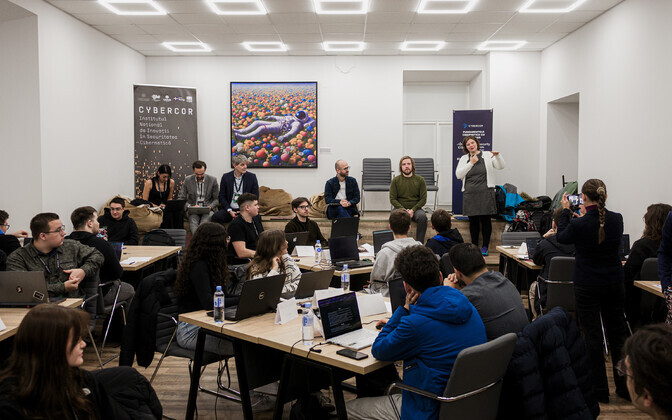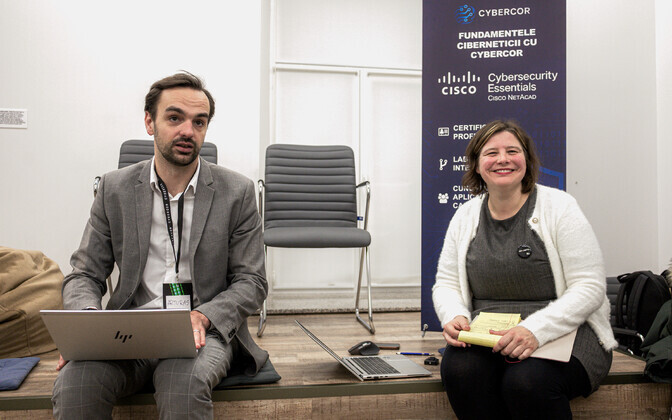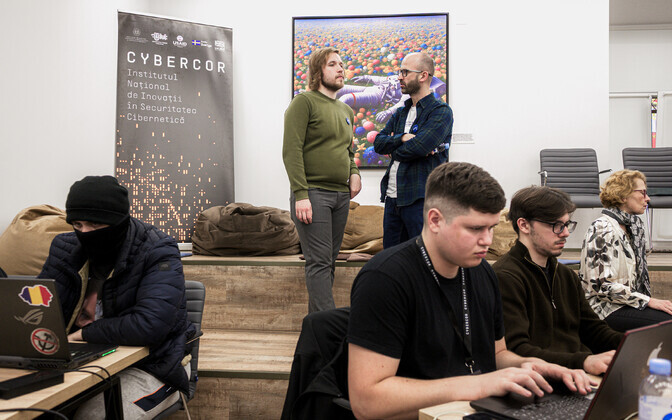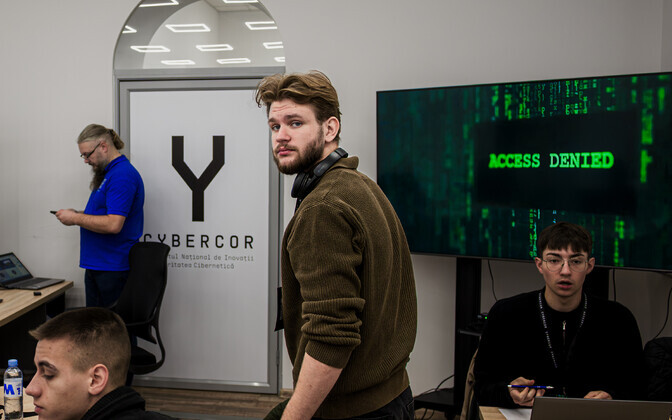This month, a joint EU-Estonia project kicked off in Chisinau, Moldova. It aims to turn the country into a cybersecurity hub for the entire region, writes Iurie Gandrabura.
In a light-filled classroom at the Technical University of Moldova, the room fell silent. Nearly 50 cybersecurity students from Moldova, Albania and Ukraine lowered their heads, concentrating on their laptops and phones. Virtually, students from Armenia and North Macedonia joined in. Flags began popping up on a big TV screen, marking the start of a “Capture the Flag” scenario – a realistic simulation of a cyberattack.
One participant, who asked not to be photographed up close because he already works in official Moldovan cyber defense, described the importance of replicating a real-life situation.
“We need people who can think on their feet. It’s not theoretical. You feel the pressure here, just like in a real incident,” he said.
“Today was hard in a good way,” said Denisa from Epoka University in Albania. “Some tasks were frustrating at first, but that’s what makes you push your logic.”
An EU-Estonia partnership to reinforce regional resilience
This intensive training is part of a longer, international training effort. It is a two-year project aimed at strengthening cybersecurity and AI skills. The majority of funding comes from the European Commission, amounting to nearly €465,000, with Estonia as a key partner contributing around €200,000. The entire project is run with Estonia’s TalTech (Tallinn University of Technology) experts on site.
 Estonia has created a new a regional cyber training hub in Moldova. Source: Iurie Gandrabura
Estonia has created a new a regional cyber training hub in Moldova. Source: Iurie Gandrabura
As Arturas Matšenas, a project manager at the Estonian Center for International Development (ESTDEV), shared, these exercises teach cybersecurity experts how to communicate, exchange information and work under pressure. “Those are the soft skills you need when something happens in a ministry or a control room,” he said.
The event itself, run by TalTech experts Birgy Lorenz and Oliver Kikas, was titled “Protocol Europa: Digital Waters Under Siege.”
Building reflexes to respond to a digital attack
The exercise was strategically designed: the game is set in 2045 Europe, prompting students to think ahead about what needs to be defended. Kikas explained that they tested “a lot more than button-pushing.”
This involved tasks where participants must write code or generate it with AI, utilizing the same toolkit used on the job, including malware analysis, modern cryptography and digital forensics.
 Estonia has created a new a regional cyber training hub in Moldova. Source: Iurie Gandrabura
Estonia has created a new a regional cyber training hub in Moldova. Source: Iurie Gandrabura
As Kikas put it: “We are learning to protect the modern world. Payments, cars, medicine, agriculture, everything depends on IT systems. Someone has to protect them, or it’s chaos.”
Marius Dumitrașcu, head of research and training at CyberCor, Moldova’s main cyber defense training center, noted that students know the theory but lack practical experience, making workshops like this crucial for building reflexes in response to real incidents.
A strategic investment in independence
This strategic investment positions Moldova as a regional hub for training.
“Cybersecurity today is about national sovereignty,” said Andres Ääremaa, ESTDEV’s program manager for e-Governance and Cybersecurity. “States rely on digital data; being able to detect intrusions and defend systems is crucial for IT professionals and for a country’s ability to exist independently.”
The program runs on two key tracks: one strengthens public institutions and critical infrastructure, and the other builds a talent pipeline through hands-on “Capture the Flag” challenges for students, aligned with European standards.
Ääremaa stressed the importance of this international support, saying: “Thanks to the Team Europe Initiative for Cybersecurity and AI, we can bring in students from abroad. Strategically, we also want Moldova to be more attractive; the more international CyberCor becomes, the stronger it gets.”
 Estonia has created a new a regional cyber training hub in Moldova. Source: Iurie Gandrabura
Estonia has created a new a regional cyber training hub in Moldova. Source: Iurie Gandrabura
By 2027, organizers aim to have about 100 trained specialists within national systems and dozens of young practitioners who can already apply AI tools in defense. The goal is to build capacity among students, government employees and critical-infrastructure operators.
For students like Florenc Skuka from Epoka University, the benefit is immediate. “We also got to talk with the Estonian mentors, and their feedback helps us understand how professionals really work,” he said.
The project proves that with strategic European and Estonian support, Moldova is rapidly becoming a key player in ensuring the digital security of the entire region.
***
This article was originally published by the Estonian Center for International Development (ESTDEV) here.
—
